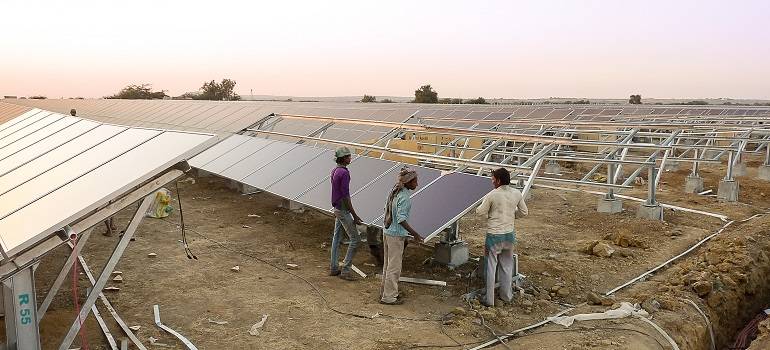
The COVID-19 pandemic has been a wakeup call for the domestic solar industry as it is heavily dependent on imports, but domestic manufacturing can be sustained only if there is profitability, a senior official of Tata Power Solar said. As much as 80 per cent of the demand for solar cells and modules are met by imports from Chinese companies.
Therefore, the imposition of work restrictions by China in eight coronavirus-affected provinces, most of which are hubs of solar module manufacturers, impacted the Indian solar industry. The developers are facing a shortfall of raw materials which is going to affect the installations in the first half of the year.
“COVID-19 pandemic is indeed a wake up call for the solar industry as the sector has been severely impacted due to the shortage of not just cells and modules but also other ancillary products.
“This calls for setting up more manufacturing facilities in India. But this will happen only if there is a long term business proposition,” the company’s Managing Director and CEO Ashish Khanna said during a webinar.
He said India has the necessary technology, which is at par with global standards, but what is lacking is the scale.
“The government is taking steps by coming up with few manufacturing-linked tenders for setting up solar capacities and has also introduced basic custom duty on imports, but we need a policy framework that will ensure longevity of offtake of the products manufactured as well as profitability,” he said.
India has set an ambitious target of adding 100 GW of solar energy by 2022 and has so far achieved installation of 34 GW.
Khanna further said manufacturing is highly capital intensive and needs to be incentivised by the government to make it more cost competitive.
“I am told that recently China proposed to set up 60 GW of manufacturing capacity, which can take care of over 50 per cent of global demand. These manufacturers get a lot of subsidies and incentives from the government and therefore can sell it at cheaper rates.
“In the post COVID-19 period, developers and contractors may go back to Chinese modules and cells if we don’t give a good quality and cheaper alternative which is made in India,” he said.
Khanna noted that if the Indian government, through various policy initiatives, can ensure scale and profitability, manufacturers will increase production, which will not just cater to the domestic market but can also be exported.
Tata Power Solar, which is largely focused on setting up solar projects on engineering, procurement, and construction (EPC) basis, also has a manufacturing unit in Bengaluru. The facility has a production capacity of 400 MW of modules and 300 MW of cells and the company is keen to invest in technology and capacity enhancement.
“If there are returns, then why will we not invest? We have already invested in setting up the facility and we are eager to invest more in technology and capacity enhancement. However, manufacturing is not just a transaction but has to be looked at from a long-term horizon,” Khanna added.
Tata Power Solar, a wholly-owned subsidiary of Tata Power, has commissioning over 425 MW rooftop projects, over 5.4 GW large projects, and more than 25,000 installations of solar water pumps across the country.
Source: PTI
